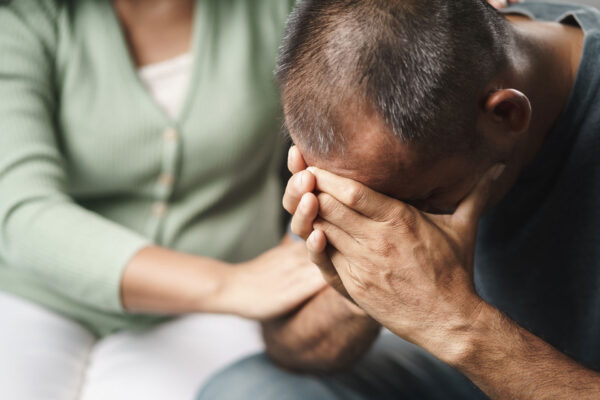When someone you care about goes through a relapse, it can be a challenging and emotional time. However, understanding that relapse is a common part of the recovery journey can offer valuable perspective and relief. A study shows that more than 85% of individuals relapse and return to drug use within one year of treatment, highlighting the importance of patience and empathy.
This article will help you take practical steps to support your loved one, better understand relapse, and implement preventive measures for long-term recovery. Remember, your support can make a significant impact in these difficult times.
What Is a Relapse?
A relapse occurs when someone in recovery returns to substance use after a period of sobriety. It’s a setback but not an end; rather, it’s a signal that adjustments are needed in their recovery plan. Understanding this can help in approaching the situation with empathy and practicality.
Signs of Relapse
- Emotional Changes. Increased irritability, mood swings, or heightened sensitivity might suggest an approaching relapse.
- Isolation. Withdrawing from social activities, family, or friends can amplify feelings of loneliness and trigger urges to use substances.
- Neglecting Self-Care. Ignoring personal well-being, such as hygiene and basic health needs, can indicate declining mental health.
- Loss of Interest. Losing interest in previously enjoyable hobbies or activities may be a warning sign.
- Overconfidence. Believing you are fully immune to relapse risks can lead to risky behaviors.
- Engaging in Risky Behavior. Being in environments associated with past substance use raises relapse likelihood.
- Cravings. Intense cravings or thoughts about returning to substance use are significant warning signs.
- Denial. Refusing to acknowledge emotions or stressors that could lead to relapse impedes seeking help.
- Breakdown of Routine. Disruptions or abandonment of structured activities can make maintaining sobriety harder.
- Changes in Thought Patterns. Negative thinking, such as blame or questioning recovery value, undermines efforts.
Stages of Relapse
Recognizing the stages of relapse is important for timely intervention and support:
Stage 1. Emotional Relapse
This initial phase involves mood changes and behaviors such as isolation or neglecting self-care. These subtle shifts can quietly set the stage for a future relapse if not addressed.
Stage 2. Mental Relapse
During this phase, thoughts of past substance use become more prominent, leading to an internal conflict between the desire to maintain recovery and the temptation of old habits. Identifying these signs early can facilitate effective support and intervention.
Stage 3. Physical Relapse
Physical relapse involves a return to substance use. It represents the culmination of ignored emotional and mental warning signs. Tackling this phase requires immediate supportive actions and reevaluation of recovery strategies to get back on track.
What Are the Risk Factors for a Relapse?
Various factors can influence relapse. Understanding these elements can help recognize potential relapse triggers and facilitate timely action.
Mood and Behavior Challenges
- Depression and Stress. Depressive feelings and high-stress levels are significant triggers for relapse, overwhelming individuals’ ability to stay sober.
- Social Influence. Being around friends or relatives who use substances can lead to relapse. A supportive social circle is vital in promoting recovery.
- Peer Pressure. The desire to fit in or succumb to pressure from peers may push someone back into substance use.
Biological and Brain Factors
- Stress Hormones. Elevated levels of stress hormones like cortisol can make staying sober difficult by affecting the body’s stress responses.
- Brain Chemistry. Lower levels of chemicals like BDNF, which are important for brain health, may hinder adapting to sobriety.
- Brain Activity and Structure. Changes in brain regions involved in decision-making and handling stress can complicate the recovery process.
Life Circumstances and Social Environment
- Personal Life. Factors such as being married, having a job, and income level can impact stability and stress, influencing relapse risk.
- Social Connections. The quality of social relationships greatly affects recovery behavior, with strong, supportive networks reducing relapse risks.
Beliefs and Intentions from Behavioral Theory
- Understanding and Attitudes. Awareness and attitudes towards drug use in one’s environment play a role in relapse likelihood.
- Control and Intention. A person’s belief in their ability to avoid relapsing and their intention to stay sober are critical to maintaining recovery.
Supporting Someone Through a Relapse
Understanding what to do when an alcoholic relapses involves a combination of understanding, empathy, and practical actions. Here are key steps to consider:
Offer Immediate Support
Approach your loved one with empathy, which means expressing genuine care and understanding for their situation. Let them know that they are not alone during this challenging time, and offer reassurance that you are there to support them. Empathy helps build trust and can ease the feelings of isolation that often accompany a relapse.
Engage in Active Listening
Creating a safe space for your loved one means allowing them to share their thoughts and feelings openly without fear of judgment. Offer a listening ear, and let them express their experiences and emotions. Active listening involves paying full attention, acknowledging their feelings, and offering them the comfort of a non-judgmental presence, which can be incredibly healing.
Guide Them to Professional Help
Encourage your loved one to reach out to mental health professionals and consider enrolling in addiction treatment programs. Professional guidance is vital for providing tailored strategies and resources necessary for effective recovery. Mental health experts can help them understand their triggers and develop coping mechanisms to manage cravings and prevent future relapses.
Facilitate Open Communication
Engage in open conversations about potential triggers and the support mechanisms available to them. Such dialogue leads to a deeper understanding of their challenges and helps them identify the support they need. Consider family therapy as an option, as it can help rebuild trust and strengthen relationships within the family, creating a nurturing environment for recovery.
Be Patient and Encouraging
Acknowledge that relapse is part of the recovery journey and emphasize its role as a learning experience. Encourage your loved one to see it as an opportunity for growth and a stronger commitment to their recovery process. Offer continuous support by celebrating their small victories and reminding them of their progress and potential for a fulfilling life beyond substance use. Reinforcement of these positive aspects can significantly boost their confidence and motivation.
Actions to Avoid When Someone Relapses
When supporting someone who has relapsed, particularly when a drug addict relapses, be mindful of certain actions that might inadvertently hinder their healing and recovery process. Here are behaviors to avoid:
Avoid Blame and Shame
Placing blame or inducing shame can be counterproductive in the recovery process. Using language that fosters guilt may deter the individual from making progress, as they might feel unworthy or incapable of change. Instead, focus on supporting their efforts to overcome the substance use disorder by maintaining a positive and encouraging environment that emphasizes their strengths and potential for recovery.
Don’t Use Ultimatums
Issuing ultimatums or making threats can increase stress and anxiety, which could trigger further use. This approach may lead to repeated consequences of relapse as individuals may feel driven by fear rather than hope. Strive to build a supportive atmosphere that is based on understanding and cooperation and promote open discussions about positive steps that can be taken instead of punitive measures.
Don’t Personalize the Relapse
It is important to view relapse as a common occurrence in many recovery journeys. Recognize that it is not a reflection of your efforts or support but rather a part of the individual’s ongoing process of healing. By distancing personal emotions from the relapse, you can offer more objective support, helping the individual focus on reassessing their recovery strategies and fostering a sense of hope and commitment to their recovery journey.
Resources to Help After a Relapse
Explore these resources for guidance and support after a relapse:
Professional Treatment Options
After a relapse, seeking professional treatment can be a vital step. Options like residential inpatient, outpatient, and intensive outpatient programs provide personalized plans addressing addiction and mental health. These plans may involve medication, therapy, and psychiatric support to manage both physical and psychological aspects.
Recovery Groups
Joining recovery groups such as Alcoholics Anonymous or Narcotics Anonymous offers a supportive community where you can share experiences and learn from others. These groups provide mutual support and encouragement, creating a sense of belonging and strength through shared experiences.
Therapeutic Tools
Therapy focused on relapse prevention can help build an effective plan to manage triggers and develop coping strategies. Approaches like cognitive-behavioral therapy and mindfulness-based therapies enhance awareness and resilience, empowering individuals to handle cravings and maintain long-term recovery.
Preventive Strategies for Future Relapse
Implement these strategies for fostering long-term sobriety:
Develop a Relapse Prevention Plan
Work with professionals to create a relapse prevention plan. Focus on identifying triggers and developing coping strategies. Update the plan regularly to address new challenges as they arise.
Strengthen Support Networks
Build a strong support network by surrounding yourself with individuals who support your recovery. Involve supportive family members and connect with local or online support groups for shared experiences and advice.
Engage in Ongoing Therapy
Regular therapy sessions help address mental health conditions that may lead to relapse. Therapists can reinforce recovery objectives and teach stress management skills, ensuring continuous personal growth and resilience.
Practice Self-Care
Commit to self-care by incorporating physical activity, a balanced diet, and adequate rest into your routine. Mindfulness practices like meditation or yoga can help manage stress and promote mental well-being.
Empowered Recovery: Embrace Support and Achieve Lasting Sobriety
Overcoming a relapse in alcohol or drug use is challenging, but recognizing it as part of your recovery journey is key. With empathy, structured support, and the right resources from Altitude Recovery, you can achieve deeper understanding and long-term recovery.
As your ally, we offer support during difficult times, reinforcing your path to long-term sobriety and a fulfilling life. Step into recovery with confidence and care through our specialized treatment programs, tailored to meet your unique needs. Let us help guide you on your path to healing and sustainable recovery.







